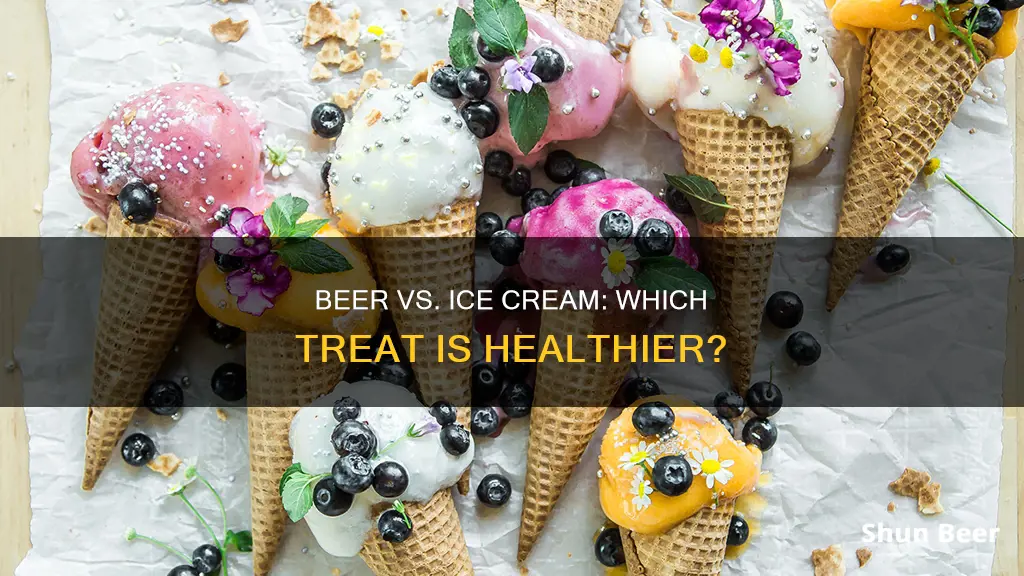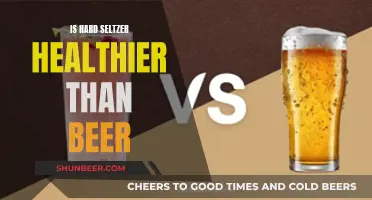
Beer and ice cream are both treats that people enjoy, but which is the healthier option? On the one hand, a single alcoholic drink is usually lower in calories than a dessert. However, cocktails and mixed drinks can contain just as many calories as sweets, and multiple drinks can quickly add up. Alcohol also provides no nutritional value and negatively impacts metabolism and fat-burning processes. While desserts are typically high in sugar, butter, and oil, they may still offer some nutritional benefits, depending on their ingredients. Ultimately, neither option is particularly healthy, but sharing a small dessert may be a better choice than consuming alcohol.
What You'll Learn
- Beer and ice cream calories: Beer is 100-250+ calories, ice cream is 150-300 calories
- Nutritional value: Alcohol has no nutrients, ice cream has some
- Effect on metabolism: Alcohol negatively impacts metabolism, ice cream doesn't
- Fat oxidation: Alcohol stops fat oxidation, ice cream doesn't
- Health effects: Alcohol is toxic and detrimental to health

Beer and ice cream calories: Beer is 100-250+ calories, ice cream is 150-300 calories
Beer typically contains fewer calories than ice cream. A bottle of beer contains around 100-200 calories, while a dessert can easily reach 500-1000 calories. A six-pack of beer is equivalent to around three cheeseburgers in terms of calories.
A comparison between beer and vanilla ice cream highlights the calorie difference. Vanilla ice cream has 207 calories per 100 grams, while beer has only 43 calories, which is 79% fewer calories.
However, it is worth noting that the calorie content of beer can vary depending on the brand and type. For example, a Leinenkugel's Apple Spice beer contains 208 calories, while a Miller Sparks Plus 7% has 288 calories.
While beer generally has fewer calories than ice cream, it is important to consider other nutritional aspects as well. Ice cream, for example, provides more vitamins and minerals, such as calcium, vitamin A, and vitamin B12. Ultimately, both beer and ice cream should be consumed in moderation as part of a balanced diet.
Angry Orchard vs Beer: Which is the Healthier Choice?
You may want to see also

Nutritional value: Alcohol has no nutrients, ice cream has some
Alcoholic drinks, such as beer, are often viewed as containing empty calories, with no nutritional value. While beer does contain some vitamins and minerals, such as B vitamins, potassium, calcium, thiamine, iron, and zinc, the amount is very small. You would have to drink a huge amount of beer to meet your daily nutrient requirements.
On the other hand, ice cream does offer some nutritional value. It provides the body with nutrients and valuable ingredients such as calcium, riboflavin, niacin, phosphorus, zinc, potassium, and magnesium. Ice cream also contains protein, which is important for building body tissues. As a milk product, ice cream also contains vitamins A and B, and, depending on the type and the way it is made, can contain varying amounts of fat.
So, while both beer and ice cream can be part of a healthy diet when consumed in moderation, ice cream has a more impressive nutritional profile.
Beer's Benefits: Healthy Bones, Strong Body?
You may want to see also

Effect on metabolism: Alcohol negatively impacts metabolism, ice cream doesn't
Alcohol negatively impacts metabolism, whereas ice cream does not. Alcohol use constricts aerobic metabolism and endurance, requiring increased conditioning to maintain weight. The high calories in alcohol, around 100-150 per drink, are not available to the muscles and are treated as fat by the body. Alcohol also inhibits the absorption of nutrients, such as vitamins and minerals, and disrupts the water balance in muscle cells, affecting their ability to produce energy.
In contrast, ice cream does not have the same negative impact on metabolism. While it may be high in calories and sugar, it does provide some nutritional value, depending on its ingredients. For example, dark chocolate ice cream with nuts or coconut can offer some nutritional benefits.
The calories in alcohol are empty calories, providing no nutritional value. Alcohol use can also lead to dehydration and slow down the body's ability to heal, further impacting overall health and metabolism. Additionally, alcohol interferes with sleep cycles, reducing the body's ability to learn and retain information.
The effects of alcohol on metabolism can be long-lasting, with research showing that consuming five or more drinks in one night can impact brain and body activities for up to three days. Conversely, ice cream does not have the same detrimental effects on metabolism and overall health when consumed in moderation.
While both beer and ice cream can be indulgent treats, the impact on metabolism clearly shows that alcohol has more negative consequences. It is important to consider not only the calorie content but also the overall effect on the body's metabolic processes when making choices about consumption.
Moscow Mule vs Beer: Which Cocktail is Healthier?
You may want to see also

Fat oxidation: Alcohol stops fat oxidation, ice cream doesn't
Alcohol can negatively impact fat metabolism and fat oxidation. When alcohol is consumed, it passes from the stomach and intestines into the bloodstream and travels to the liver. Here, the enzyme alcohol dehydrogenase converts alcohol into acetaldehyde, which is then rapidly converted into acetate by other enzymes. This process means that alcohol is not stored as fat but instead converted into acetate. The amount of acetate formed is dose-dependent on the amount of alcohol consumed. For example, blood acetate levels were found to be 2.5 times higher than normal after consuming vodka. This sharp rise in acetate inhibits fat loss.
The body tends to use whatever fuel is most readily available. When acetate levels rise, the body prioritises burning acetate over fat since it is the same product as beta-oxidation of fatty acids and glycolysis but without the metabolic work. Thus, the body burns the acetate first, pushing fat oxidation out of the metabolic equation.
Alcohol can stop the body from burning fat for up to 12 to 36 hours, depending on the individual and the dose consumed. This is because the body treats alcohol as a toxin and prioritises metabolising it over other nutrients, such as fat. As a result, fat can be stored in the liver, leading to liver disease and weight gain over time.
On the other hand, ice cream does not directly stop fat oxidation. While it provides a large amount of fat and carbohydrates, the body will continue burning fat and carbohydrates after consuming ice cream. However, the high-calorie content of ice cream means that the body will likely not burn stored body fat anytime soon.
Hoppy Beers: Healthy or Hype?
You may want to see also

Health effects: Alcohol is toxic and detrimental to health
Alcohol is a toxic substance that can have detrimental effects on the body and brain. Drinking alcohol, especially in excessive amounts, can cause serious short- and long-term health issues.
Firstly, alcohol interferes with the brain's communication pathways, impacting mood, behaviour, clear thinking, and coordination. It can also lead to more severe mental health issues, including depression and anxiety, and even increase the risk of suicide.
Secondly, alcohol consumption can take a toll on the heart, causing problems such as cardiomyopathy, arrhythmias, and high blood pressure. Heavy drinking can also lead to liver inflammation, such as steatosis or fatty liver, and can cause the pancreas to produce toxic substances, resulting in dangerous pancreatitis.
Thirdly, alcohol is a known human carcinogen, increasing the risk of several types of cancer, including head and neck cancer, esophageal cancer, and breast cancer. Even moderate drinking can increase cancer risk, and excessive drinking can lead to alcohol-related deaths.
Additionally, alcohol negatively impacts the immune system, making it harder for the body to fight off infections and diseases like pneumonia and tuberculosis. It also affects fat and carb oxidation, halting fat-burning processes and negatively influencing metabolism.
Lastly, excessive drinking can lead to social and wellness issues, learning and memory problems, and relationship difficulties. It can also increase the risk of injuries, violence, alcohol poisoning, overdose, and sexually transmitted infections.
In summary, alcohol is a toxic substance that can cause extensive damage to the body and mind. While ice cream may be high in sugar and fat, it does not have the same detrimental effects on health as alcohol when consumed in moderation. Therefore, when it comes to choosing between beer and ice cream, ice cream is the healthier option in terms of toxicity and overall health impact.
Healthy Beer Consumption: How Many Monthly Brews Are Safe?
You may want to see also
Frequently asked questions
While neither beer nor ice cream is particularly healthy, beer is likely to be worse for you. Alcohol has no nutritional value, and it stops your body from burning fat and carbs. Beer is also likely to be higher in calories than ice cream.
A beer typically contains between 100 and 200 calories. An ice cream sandwich is around 150 calories. However, a pint of beer and a pint of ice cream are likely to be similar in calories.
If you are choosing between a beer and a very sugary dessert, beer might be the better option. While it has no nutritional value, it is likely to be lower in calories.







